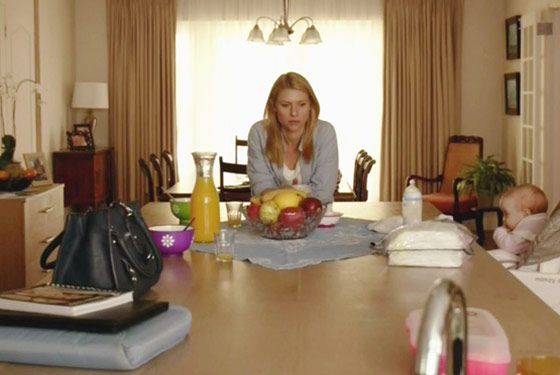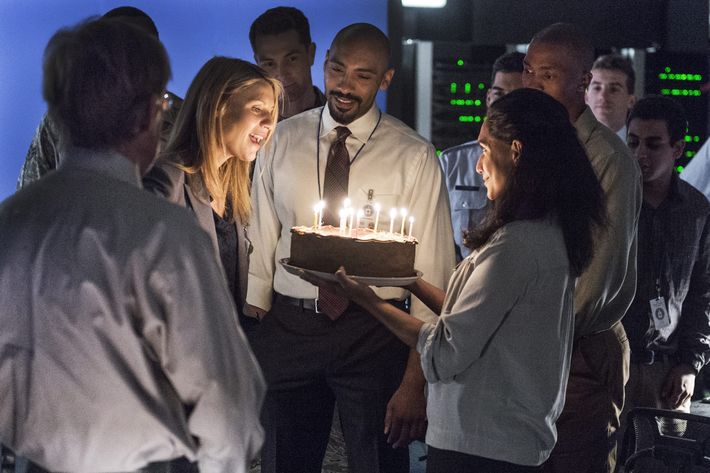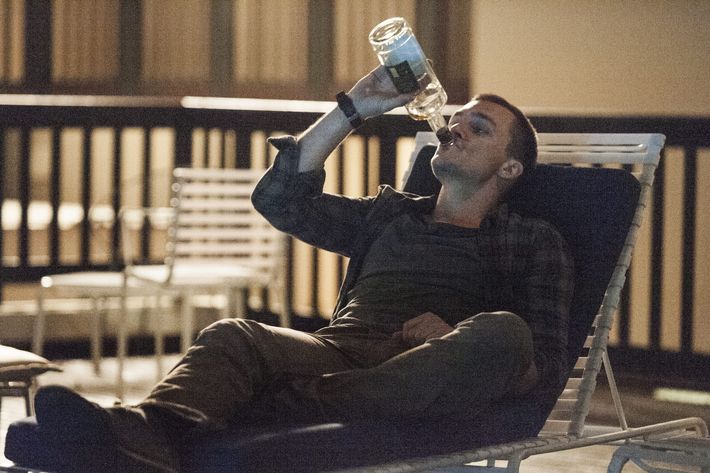
Working single mothers: How do they do it? In the case of Homeland’s Carrie Mathison, being a successful working single mother requires only white wine, sleeping pills, and living 7,000 miles away from your child. Hmm, upon reflection, it seems that perhaps Carrie Mathison is not actually a very good single mother and is in fact not doing it. Still, in the premiere of Homeland’s fourth season, we learn that the only thing that stresses Carrie out more than international terrorism is the contents of her womb, and this was one of the show’s most fascinating twists to date. Imagine a reverse Rosemary’s Baby, where the mother has the demons.
The greatest trick Homeland ever played was convincing us all that it was prestige television. Fantastic, enthralling, and inspired television, yes, it is definitely those things a lot of the time. But prestigious? Let’s save that designation for shows that aren’t terrorism fun-house cartoon hours. But where the first three seasons ramped up its pulp theatrics while remaining anchored by the various psychosexual international nightmares of soldier turned terrorist turned Congressman turned martyr Nick Brody, the first two episodes of this new season suggest a more open premise with a freshly punched reset button. And, you know, the always-riveting threat of infanticide.

Did you cringe last season at the soapy cliché of Carrie becoming pregnant with Brody’s love child? I really did. Carrie shouting at everybody while wearing a Babybjörn was not my idea of a good time. But shame on us for assuming Homeland would traffic in anything other than absolute darkness when it came to exploring Carrie’s mothering skills. The fact that Carrie seemed reluctant to hold her daughter, seemed ignorant as to the basics of feeding and diapering her, or her casual decision to place the baby’s car seat in the passenger-seat airbag decapitation zone were all chilling enough. But did you see that bathtub scene coming? The sight of Carrie slowly lowering her daughter beneath the water was one of the darkest things Homeland has ever done. Sure, we shouldn’t have expected Carrie to lapse into madness this soon in the season, but it’s to Homeland’s credit that I truly didn’t know what would happen next. In this case, she came to her senses, handed the baby off, and immediately worked to get herself transferred back overseas, but man. Can you imagine? “Oh, season four was the season where Carrie killed her baby. Plus, she fought terrorism.”

So, the first half of the two-episode premiere, “The Drone Queen,” introduced us to the new status quo that would soon become disrupted: It’s some time after Brody’s death and Carrie had been stationed in an Afghan war zone, where she supervised drone strikes against the CIA’s “kill list.” But after some dodgy intel led to the mass murder of an entire wedding party, our titular Drone Queen (per the birthday cake Carrie’s staff bought her) found herself at the center of an international outcry that included riots, Embassy prevarications, and hunky American soldiers shaming Carrie in dive bars. Finally, after a CIA agent is straight-up beaten to death in the streets, Carrie is called home to become the fall gal for the entire incident, and worst of all: She can’t avoid that red-headed baby anymore. Was she not a fan of that baby due to its red hair or for other, more complex reasons? As a redhead myself, I can tell you that it probably played a part.
Anyway, Carrie wasn’t the only character to drift through the season opener like wayward Mylar balloon. We learned that Saul’s post-CIA career found him working for a private weapons contractor and that Peter Quinn had left his black-ops days behind in favor of, I don’t know, sending faxes? Point is, neither man was happy with his new station in life. Despite the fact that Saul and Mira were now living in what appeared to be a West Elm showroom in Manhattan, it was clear that he missed his old days as a government spook. And Quinn had murdered one too many street insurgents to be having a good time anymore, so he jumped at the chance to return to the states with Carrie.

The question of what these characters would do now that their new lives had begun to crumble was quickly answered in the second part of the premiere, “Trylon and Perisphere.” It was only here that we began to get a sense of where this season is headed, as by episode’s end, the demoted Carrie had blackmailed her way back into Islamabad with a newly rehired Saul on her team. Phew, right? No, no phew. Because Carrie left at the expense of her daughter, and the troubled look on Carrie’s face as she sat in that government jet insisting out loud to herself that “I’m fine” made me think that she is probably not fine. For his part, Peter Quinn officially parted ways with Carrie, declining her invitation back into a war zone, instead preferring to drink his sads away while occasionally having blackout sex with his gorgeous yet overweight landlord. It was this latter subplot that veered so wildly away from Homeland’s premise that it threatened to be just another soapy wheel-spinner akin to whatever Dana Brody was up to the first three seasons. But much like Quinn’s desire to escape his worries, this burgeoning friendship/romance/whatever with his landlord provided a fun diversion for we the viewer also to escape the stresses of the rest of the episode. Also, come on. Quinn is perfect. Quinn can do anything he wants, and it’s good television.

Probably the most fascinating setup carried out by these two episodes was what appears to be a season-long exploration of how terrorists are born. In a moment that mirrored Brody’s rescue in the pilot, a young man’s body is dragged out of the ground (in this case, the rubble of the wedding in which his family was killed), and in the ensuing weeks, he’s pulled between different factions with vastly different agendas. We obviously sympathize with Aayan for his grief, but also his reticence to continue the cycle of violence, and also he is very cute. Three big reasons to sympathize with him. But with his roommate pressuring him into extremism and the outside world holding him up as a tragic reminder of America’s atrocities, we’re looking at the possible transformation of an ordinary boy into a major player in an increasingly destabilized region. That these first two episodes took their time to paint him as a three-dimensional, fleshed-out person with understandable wants and needs is a refreshing change of pace on a show where Middle Eastern characters are not always, uh, complex.
It seems borderline unfair to judge a season of Homeland after only viewing what amounts to its introduction, but it’s clear enough by now that a Brody-free Homeland is definitely still worth watching. Every frame of Claire Danes’s performance remains incredible, and the show still knows how to present a seemingly grounded world before unleashing some of the least subtle story mechanics outside of daytime soap operas. But while Showtime and Emmy voters may insist this is prestige television, I think it’s actually something better: It’s moving, scary, and entertaining in ways that are rarely predictable. What other show but this one would openly explore the concept of a mother who essentially hates her baby? As long as Homeland ventures ever onward into its particular brand of darkness, it should remain essential viewing.

